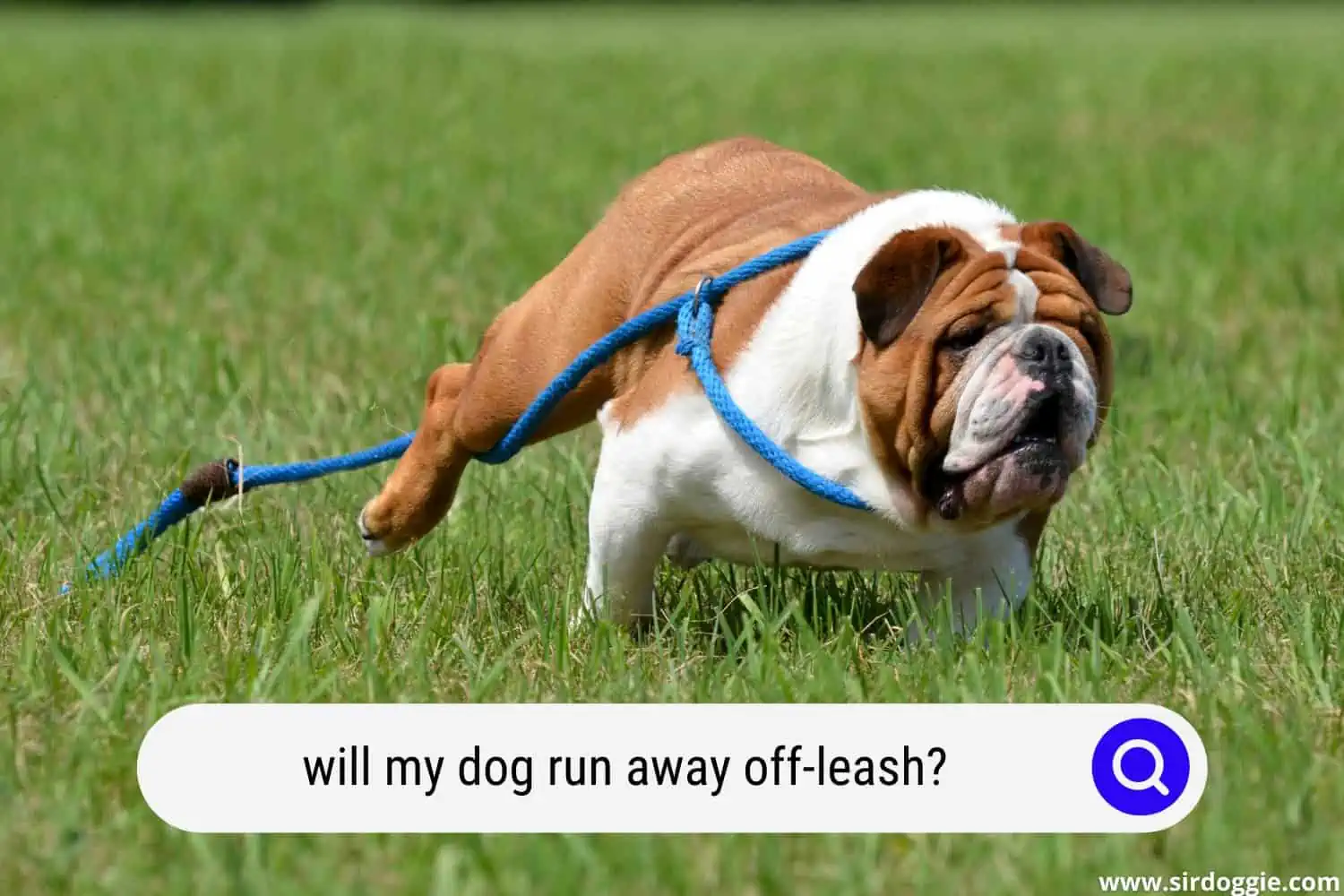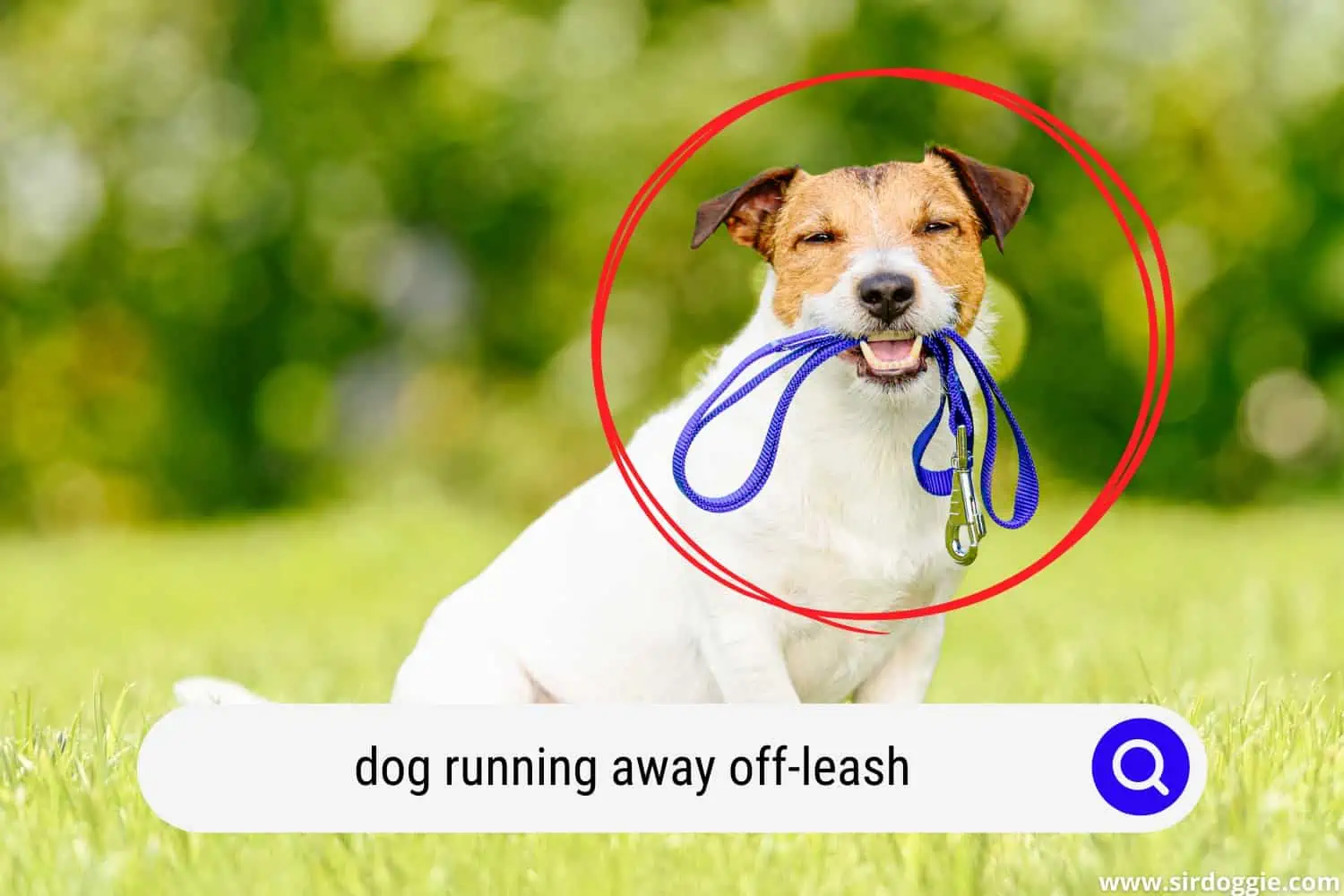Will My Dog Run Away Off-Leash? (With Great Tips)
Nearly every dog owner has the same worry when letting their dog off-leash: will they run away? If they do, will you be able to get them back? What if they don’t? Will they get hurt? It’s not hard to imagine all the reasons why you might not want to let your dog off-leash. Other people, other animals, wildlife, and busy roads are all potential hazards for a dog. Rodenticides and insecticides in public spaces are a concern, too. That said, there are so many benefits to being off-leash that you’ll likely still want to determine whether it’s fully safe or not to do with your dog.

Whether your dog will run away when off-leash depends upon your dog as well as the situation. If your dog has never been trained to be off-leash or isn’t well trained in recall, then yes, they will probably run away if let off-leash. There is no guarantee of a dog’s response to being given complete freedom—even the best-trained dogs will sometimes run under the right circumstances.
However, there are numerous benefits dogs can experience when they are allowed off-leash. If you’re worried about them running away, there are also several things you can do to minimize the risk of your dog running away off-leash as well.
Related Reading: Top Reasons Dogs Run Away To Die [BEHAVIOR EXPLAINED]
Benefits of Being Off-Leash
Dogs get a chance to play and exercise off-leash in ways that they simply just can’t do when at home or on a leash while they’re out. They can play with other dogs, play fetch, participate in agility, or just simply run free at a speed most owners couldn’t possibly keep up with if still tethered to their dog.
Dogs who are trained and exercised off-leash develop greater confidence than those who are always on a leash all the time. They get a chance to make decisions for themselves that aren’t always micro-managed by their owner. However, whether they make good ones or not depends on their training as well as their personalities.
More freedom also offers your dog a chance to burn off some of their excess energy. Well-trained off-leash dogs will go free but “check in” with their owners regularly. The number of miles they cover while running back and forth is significant and would take far longer to achieve if you were the one trying to walk or jog alongside them and keep up.
Of course, all this running off-leash can lead to injuries, altercations, and other problems too, though. So, before you let your dog go, let’s look at some ways to make your dog’s off-leash experience as safe as possible.
Tips for Taking Your Dog Off-Leash
When training your dog to behave well off-leash, be patient and consistent. Good behavior doesn’t happen overnight, and if your dog has never been off-leash, it will take a while for him to become reliable.
Establish good behavior
Before going off-leash, you should be certain that your dog is trained in reliable recall. He or she should consistently come when called—the first time and every time. Working on training your dog in this behavior in your backyard or in other fenced areas where your dog can’t run away before moving out in the open for any off-leash activities.
If you’ve tried teaching your dog to “come” using traditional methods and it doesn’t seem to be working, take a few steps back to assess why they’re having trouble with the task. There are a few reasons your dog’s recall may not be so great:
- They don’t understand. Sometimes, you just have to start over with training commands to ensure your dog understands what you’re asking of them.
- They don’t care. Unfortunately, sometimes our dogs understand exactly what we’re asking of them but ignore the request. This is often a result of not having a good enough reward at the other end, and it often happens with well-meaning owners who have done this by accident.
Let’s look at a common example. You let your dog off-leash at the park, and he took off into the bushes. You called him to “come,” but he ignored the command and continued to run. You repeated the command several times, and eventually, your dog came bounding back to you, happy as can be. However, you scolded him for being bad and running off once he finally got to you.
What you experience: Your dog was naughty and didn’t listen, so he deserves a reprimand.
What your dog experiences: I came when my owner called, but then I got in trouble, so I’m not coming next time.
Even though it seems counter-intuitive, if your dog comes to you when called, you need to praise him for it even if you’re mad at whatever he was doing before showing up.
- They’re nervous or afraid of you. If this is the case, you may need to consider how you train your dog. Dogs who are trained mainly by being scolded for unwanted behaviors may behave well, but it’s out of fear of a negative consequence. In this case, your dog may not be coming because he’s afraid of what will happen if he does (see example above).
Start with a long leash
Long leashes (see Amazon) are a great way to give your dog some extra freedom while still giving you the peace of mind that your dog won’t run away. This should only be used as a temporary measure while you assess your dog’s readiness for full off-leash privileges.
Note: Be cautious when using a long leash as they can cause dogs to become tangled up and cause injury.
Practice in a fenced dog park
Fenced dog parks are great places to practice your dog’s off-leash skills while ensuring your dog remains in a fenced area.

Know what to do if your dog makes a break for it
Your first instinct when your dog takes off is going to be to yell and run after them, but this choice of action is wrong. Here’s what you should do instead:
- Stay calm. Your dog is less likely to come back if he thinks you are angry or fearful.
- Show him you’ve got treats as an extra incentive.
- Use your command word to call him back to you. This is why it’s so important to train for reliable recall in your dog.
- Don’t chase them. You won’t be able to outrun your dog, and you’ll only encourage him or her further to play a game of chase.
- Turn away from them. Sometimes your best bet is to turn away from your dog to get them to come back.
- Praise them when they come back, no matter how long they’ve been gone. If you don’t, they’ll be less likely to return next time when you try to call them back to you.
Related Reading: My Dog Wants to Play All the Time: What Do I Do?

Family Dog Expert Author
Hi there! I’m Stuart, a devoted dog lover and family dog expert with over a decade of experience working with our furry companions. My passion for dogs drives me to share my knowledge and expertise, helping families build strong, loving bonds with their four-legged friends. When I’m not writing for SirDoggie, you’ll find me hiking, playing with my beautiful dog, or studying music.